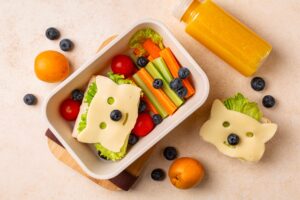Eating for better focus at school

As the new school year unfolds, it’s important to ensure that children are equipped with the right nutrition to enhance their focus and energy levels.
As the school year gets into full swing, parents and children alike are navigating the bustling routine of homework, extracurriculars and early mornings. One often overlooked factor that can make a significant difference in your child’s academic performance is their diet. Believe it or not, what’s on their plate has a profound impact on their focus, energy and overall learning experience at school. So, let’s dive into how you can boost children’s concentration with a few tasty, nutritious tweaks!
Start with breakfast
A balanced breakfast fuels your child’s brain, kick-starts their metabolism and sets them up for a productive day ahead. Try to opt for complex carbohydrates like whole-grain cereals or porridge, paired with proteins such as eggs or Greek yoghurt, for slow-releasing energy that avoids a crash. Adding a handful of berries or a banana can provide the perfect dose of vitamins and natural sugars for some extra sustained energy.
Embrace Omega-3
When it comes to brain health, omega-3 fatty acids are a must. These healthy fats play a big role in cognitive function and memory. Incorporating some omega-3-rich foods into your child’s diet will keep their brain sharp and ready for learning. Oily fish like salmon or mackerel are excellent sources, but if fish isn’t a favourite, try adding chia seeds or walnuts to kids’ meals. These small but mighty ingredients can make a big difference in their focus and overall brain health.
Power up with protein
Protein isn’t just for building muscles, it’s also vital for clear cognition. Including protein-rich foods in your child’s meals and snacks will help them maintain stable energy levels and enjoy improved concentration. Lean meats, dairy products, nuts and beans are all brilliant choices. For a quick and nutritious snack, consider homemade protein bars or a handful of almonds. These not only keep hunger at bay (as protein is incredibly satiating), they also provide a steady supply of brain-enhancing nutrients.
Hydrate properly
Even mild dehydration can impair concentration and memory, so it’s really important to ensure your child stays fully hydrated. Water is the best choice for quenching thirst and keeping their brain at its best, so encourage your little one to drink water throughout their day, and offer water-rich fruits like watermelon and oranges as snacks.
Choose whole foods
It’s tempting to reach for sugary snacks and drinks for a quick energy boost, but these can lead to energy crashes and reduced focus very quickly. Instead, aim for whole foods that provide sustained energy. Fresh fruits, vegetables and whole grains are not only bursting with nutrition, but also help keep blood sugar levels steady. Carrot sticks with hummus, apple slices with peanut butter, or whole-grain crackers with cheese are great alternatives to sugary treats.
Say hello to superfoods
Certain foods are known for their brain-boosting properties. Blueberries, for example, are packed with antioxidants that can enhance cognitive function, and dark leafy greens, like spinach and kale, are rich in vitamins and minerals that support brain health. Adding a variety of these superfoods to your child’s diet can provide an extra edge in their focus and learning capabilities.
Vitamins for concentration
Vitamins are vital for maintaining good concentration. B vitamins, found in whole grains, eggs and dairy, are involved in energy production and brain health, helping regulate neurotransmitters, which are central to mood and focus. Vitamin C, abundant in fruits like oranges and strawberries, supports cognition and helps reduce mental fatigue. Additionally, Vitamin D, which can be obtained from sunlight and fortified foods, plays a significant role in brain development and function. Including these vitamins in your child’s diet can help keep their mind sharp throughout the school day.
Minerals for focus
Minerals are another big component for maintaining focus and energy levels. Iron, found in lean meats, beans and fortified cereals, is essential for oxygen transport in the blood and can prevent fatigue, while improving concentration. Zinc, present in nuts, seeds and dairy products, is great for overall learning and memory. Magnesium, found in leafy greens, nuts and whole grains, regulates brain function and reduces stress. If you can make sure your child gets these essential minerals, you’ll greatly enhance their ability to stay focused and energised during school hours.
Balanced lunches
A well-balanced lunch is one that includes a mix of complex carbs, proteins and healthy fats. Think whole-grain wraps with lean turkey and avocado, or a hearty quinoa salad with mixed vegetables and chickpeas. By avoiding overly processed foods and including nutrient-dense ingredients, you’ll ensure your child stays engaged and in top form during their afternoon classes.
After-school snacks
After a long day at school, your child might feel a bit peckish. Instead of reaching for sugary snacks or chips, offer healthier alternatives. A smoothie made with yoghurt, fruit and a handful of spinach can be both tasty and nutritious, and homemade trail mix, with nuts, seeds and dried fruit, is another fantastic option. They provide a mix of protein, healthy fats and natural sugars to keep kids’ energy up so they can tackle their homework in a good mood and with plenty of motivation.
Set an example
Children often model their behaviour after their parents. By maintaining your own healthy eating habits, you will set a positive example for your little one to follow. If you can make family meals a time for everyone to enjoy nutritious food together, and involve your child in meal planning and preparation, you are practically guaranteed that they will eat well at school without much hassle.
Keep things fun
Eating healthily doesn’t have to be boring, especially if you let your child choose and prepare colourful fruits and veggies, or create fun, healthy recipes together. When food is enjoyable and engaging, your little one is more likely to embrace it and reap the full nutritional benefits.
Adding these foods into your child’s daily diet can have a really remarkable impact on their focus and overall classroom performance, enhancing their concentration and helping them to do their best academically!
Image Credit: ShutterStock











Comments